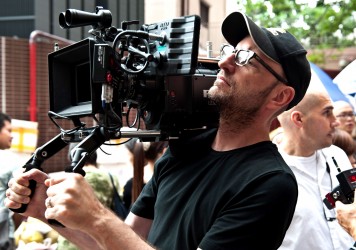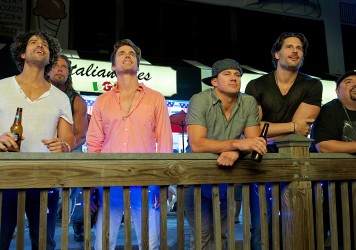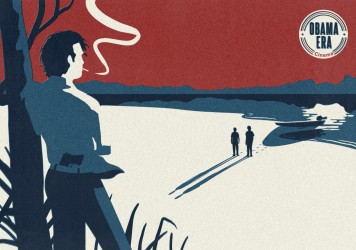The return of the king – Steven Soderbergh is making movies again, and has delivered one of his all-time best.
It’s hard to know what to think of America any more. Back in the days of relative normalcy, there was the north and the south, divided by ripe caricatures of effete intellectuals on one side and hyuk-hyuk’ing, hog-riding yahoos on the other. Now, the battle lines have been at once blurred and hardened. Beliefs are now forged around identity (and not vice versa), almost as if people feel the need to live up to their own crude stereotypes for fear of allowing the other side an inch. Trigger fingers are itchy, and the conditions for cultural civil war are fomenting.
And so, it might seem that at this time of high tensions, a caper film revolving around genteel southern manners and what might charitably be termed as the ‘hillbilly’ archetype, would be about as welcome as a canteen full of watery grits. But this film, Logan Lucky, is directed by Steven Soderbergh, and to call it a work of pin-sharp diplomacy would be both an understatement and a disservice to its blissfully warmhearted depiction of both locals and locale. Soderbergh makes movies with the same grace and subtle magic that Mary Poppins uses to clean bedrooms, and it’s a thrill to have him back in the fold after a hiatus working in television.
This one isn’t an overtly political film, as satire is a mode that’s beneath this master filmmaker. But its politics come as a natural byproduct of the way he and enigmatic debut screenwriter Rebecca Blunt plant real, unpredictable souls within familiar bodies. This also isn’t just a case of a director playing a game of inverting norms and types to defy expectation. It’s about combining the visuals, the performances and the way the story is told to evolve these potential caricatures into fragile, empathetic people.
Channing Tatum’s divorced, amiable odd-jobber Jimmy Logan is fired from a job digging out sink-holes beneath the Charlotte NASCAR speedway for having a gammy leg, something he neglected to mention on his application form. He needs to make some money, and so concocts an elaborate scheme to stiff the event of its ample food concession dollars during one of the season’s showcase contests.
The film appears as a southern re-run of Soderbergh’s wildly popular Danny Ocean movies, with casinos and high-spec bank vaults replaced with more homefried venues (motor homes, dive bars, mobile clinics, county fairs) and a less intricate methodology. Indeed, there is a lovely, almost farcical element to the mechanics of the plot, that eventually develops from a comic-hued genre movie to a humanist fairy tale. While the heist itself is great fun and executed with the elan and meticulous precision we’d expect from this director, it’s the small, wrap-up coda at the end which leaves you walking on air.

The film also brings together an ensemble for the ages, where your favourite character is always the one who’s just been on the screen: Adam Driver, extending an incredible run of top-down screen reinventions, reveals yet another string to his bow as he affects a misshapen southern drawl to play one-armed bartender, Clyde Logan; Daniel Craig gives heart and common sense to his bleach-blonde explosives expert, Joe Bang; then there’s Riley Keough as Mellie Logan, a hair stylist and out-of-hours petrol head. Katherine Waterston, Katie Holmes and Seth MacFarlane are all along for the ride, and each brings something unique to the pot.
It’s a tremendously funny film, due more to its sustained deadpan tone than the deployment of elaborate set pieces or scene-stealing side players. The film opens on Jimmy Logan explaining to his young daughter Sadie (Farrah Mackenzie) the improbable story behind his favourite song, ‘Take Me Home, Country Roads’ by John Denver. Logan Lucky is itself a fictionalised folk tale, a yarn for Sadie to eventually spin to her own children, with underdog fortune-hunters eventually becoming an unlikely source of civic inspiration.
And while the film derives from such a lovable and louche lineage as 1972’s The Hot Rock, 1973’s The Sting and even Soderbergh’s own exemplary Out of Sight, from 1998, it also recalls Robert Altman’s scintillating 1975 fresco charting the overlap between culture and politics in the American south, Nashville. With this film too, the south isn’t just a context or a handy backdrop on which the machinations play out – it is the movie.
It deals with the myth of trickle-down economics, the transgression inherent in unflagging pride, the ambiguity of patriotism, the all-consuming power of family, the notion of religion as a crooked but ruggedly workable moral guiding light, and the role of public relations in law enforcement. But it also deals with the ways people keep happiness alive and the hopeful ambiguity of the American dream. As Joe Bang’s brother Sam exclaims at one point, “NASCAR is America”. Logan Lucky is about how American is, in the end, anything you want it to be.
Published 18 Aug 2017
One of our all-time favourite directors has come out of retirement.
An all-American heist caper that overflows with soul and humanity.
The script, the direction and the performances work in concert like a souped-up muscle car.

The director has come out of retirement for a Channing Tatum starring NASCAR comedy.

Channing Tatum leads a troupe of sensitive male strippers in this explosively sexy road trip movie.

Each of the Arkansas director’s films addresses pressing social concerns affecting working-class white voters.